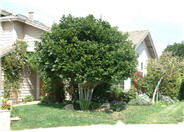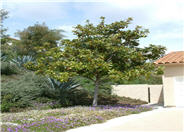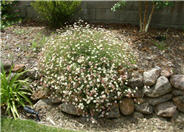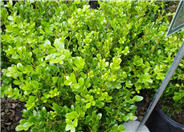
Common name:Carrotwood, Cupania
Botanical name:Cupaniopsis anacardioides
This evergreen tree will grow up to 40' high and has leathery, dark green leaves. When the trees approach maturity, yellow to orange fruit may be produced; it does well in wet soil.

Common name:Boston Ivy
Botanical name:Parthenocissus tricuspidata
This deciduous vine grows leaves that are usually lobed and divided into 3 leaflets. It clings tightly to any surface.

Common name:Southern Magnolia, Bull Bay
Botanical name:Magnolia grandiflora
Its large, simple, leathery appearance makes the pyramidal Magnolia grandiflora perfect for either a street or lawn tree. Its leaves are 4"-8" long, and its powerfully fragrant blooms are carried throughout the summer. Reddish brown cone shaped fruit appear in the fall. If these plants are grafted, they are more predictable (may take 15 years to bloom). Ungrafted trees will take only 2-3 years. Restricted root areas or heavy soils will slow the growth process.

Common name:Santa Barbara Daisy, Mexican Daisy
Botanical name:Erigeron karvinskianus
This low mounding perennial, with fine leaves and white to pinkish, daisy-like flowers, is an excellent asset to rock gardens.

Common name:Japanese Boxwood
Botanical name:Buxus microphylla japonica
Japanese Boxwood is often used as a hedge. It is compact, with small bright green leaves. It can reach 4'-6' tall and wide or be kept smaller through pruning. It can be sheared to shape. It does better in areas with milder winters.
| Designer: Julie Molinare | Patio Area |
Photographer: GardenSoft |
Soils and Compost:
Maintain a two to four inch layer of mulch on the soil surface to reduce weeds, infiltrate rain water, and reduce compaction.
Water Saving Tip:
Change spray sprinklers to low-flow bubbler or drip systems. Shrubs and trees are ideal candidates for this type of irrigation because the water is applied directly to the root zones.
Integrated Pest Management:
Develop healthy soil for plants that are vigorous and naturally pest-resistant.

